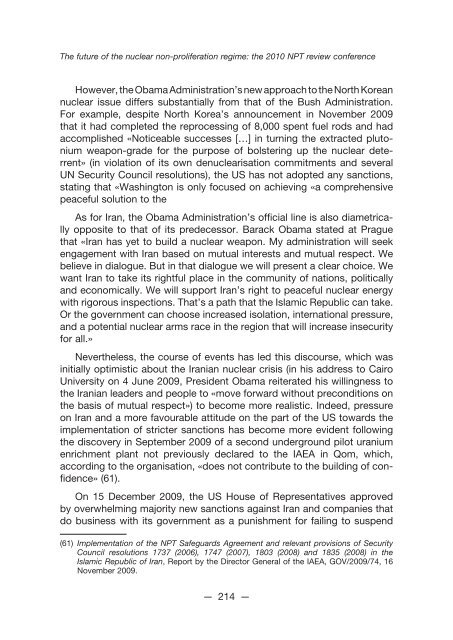Strategic Panorama 2009 - 2010 - IEEE
Strategic Panorama 2009 - 2010 - IEEE
Strategic Panorama 2009 - 2010 - IEEE
You also want an ePaper? Increase the reach of your titles
YUMPU automatically turns print PDFs into web optimized ePapers that Google loves.
The future of the nuclear non-proliferation regime: the <strong>2010</strong> NPT review conference<br />
However, the Obama Administration’s new approach to the North Korean<br />
nuclear issue differs substantially from that of the Bush Administration.<br />
For example, despite North Korea’s announcement in November <strong>2009</strong><br />
that it had completed the reprocessing of 8,000 spent fuel rods and had<br />
accomplished «Noticeable successes […] in turning the extracted plutonium<br />
weapon-grade for the purpose of bolstering up the nuclear deterrent»<br />
(in violation of its own denuclearisation commitments and several<br />
UN Security Council resolutions), the US has not adopted any sanctions,<br />
stating that «Washington is only focused on achieving «a comprehensive<br />
peaceful solution to the<br />
As for Iran, the Obama Administration’s official line is also diametrically<br />
opposite to that of its predecessor. Barack Obama stated at Prague<br />
that «Iran has yet to build a nuclear weapon. My administration will seek<br />
engagement with Iran based on mutual interests and mutual respect. We<br />
believe in dialogue. But in that dialogue we will present a clear choice. We<br />
want Iran to take its rightful place in the community of nations, politically<br />
and economically. We will support Iran’s right to peaceful nuclear energy<br />
with rigorous inspections. That’s a path that the Islamic Republic can take.<br />
Or the government can choose increased isolation, international pressure,<br />
and a potential nuclear arms race in the region that will increase insecurity<br />
for all.»<br />
Nevertheless, the course of events has led this discourse, which was<br />
initially optimistic about the Iranian nuclear crisis (in his address to Cairo<br />
University on 4 June <strong>2009</strong>, President Obama reiterated his willingness to<br />
the Iranian leaders and people to «move forward without preconditions on<br />
the basis of mutual respect») to become more realistic. Indeed, pressure<br />
on Iran and a more favourable attitude on the part of the US towards the<br />
implementation of stricter sanctions has become more evident following<br />
the discovery in September <strong>2009</strong> of a second underground pilot uranium<br />
enrichment plant not previously declared to the IAEA in Qom, which,<br />
according to the organisation, «does not contribute to the building of confidence»<br />
(61).<br />
On 15 December <strong>2009</strong>, the US House of Representatives approved<br />
by overwhelming majority new sanctions against Iran and companies that<br />
do business with its government as a punishment for failing to suspend<br />
(61) Implementation of the NPT Safeguards Agreement and relevant provisions of Security<br />
Council resolutions 1737 (2006), 1747 (2007), 1803 (2008) and 1835 (2008) in the<br />
Islamic Republic of Iran, Report by the Director General of the IAEA, GOV/<strong>2009</strong>/74, 16<br />
November <strong>2009</strong>.<br />
— 214 —

















